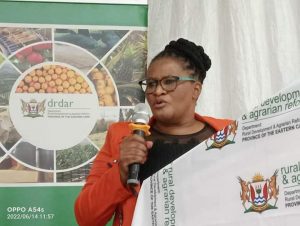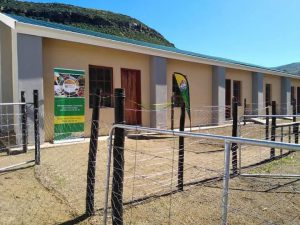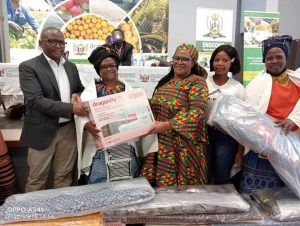
by Olwetu Batyi | Aug 11, 2022 | Uncategorized

About 800 learners from the Nelson Mandela Metro Municipality attended the roadshow organized by Food for Mzansi news site in Kariega (previously Uitenhage) at the Hoërskool Brandwag.
DRDAR was represented by the Communication and Customer Care Services and their exhibition stall was frequently visited by pupils seeking information.

As we celebrate Women’s Month it was interesting to see more female learners making enquiries at the stall wanting to get information on how they can venture into the male dominated sector.


by Olwetu Batyi | Jul 21, 2022 | Uncategorized

DRDAR provided seedlings to 20 households and Langalitshoni JSS at Emaplotini Village, chicken Feed and bags of fertiliser to a local cooperative. As part of the build up to the main event, the Department’s Veterinary Services vaccinated cats and dogs for rabies, conducted sheep scab and blanthrax vaccinations.
Locals were also educated about plant and animal sciences.

by Olwetu Batyi | Jul 21, 2022 | Uncategorized

The Department of Rural Development and Agrarian Reform’s Human and Institutional Capacitation Chief Directorate hosted learners from various schools across the province, as part of creating awareness about the Agricultural sector.
Learners were exposed to the Agricultural sector and the entire value chain including animal health/production, home industry such as baking and yoghurt production, animal anatomy and veterinary services.
Daniel Matlou a microbiologist at TARDI shows some of the learners different animal organs, skeletons and parasites.

by Olwetu Batyi | Jul 21, 2022 | Uncategorized

MEC PIETERS TELLS YOUTH TO IDENTIFY GAPS IN EXISTING MARKETS
WITH many Agricultural markets said to be saturated already and some hogged by established institutions, MEC for Rural Development and Agrarian has challenged the youth of the province to think smart and identify gaps on the existing markets.
Pieters was speaking at a Youth Entrepreneurship Workshop held in Port St Johns on Tuesday [June 14] this week where she said the competition was already too high for beginners in many markets but the youth had their special space with their innovative ideas.
The workshop is part of this year’s commemoration of Youth Day under the theme: “Growing South Africa together in the period of Covid 19.”
Currently, the Eastern Cape is listed among the top producers of citrus in the country but the mesh citrus sacks in which they are packed and sold are sourced from the Kwa-Zulu Natal Province.
“The local production of mesh citrus sacks is just one of many gaps that young people of today need to exploit. Efforts are made at parliament level to implement and amend policies where necessary to create a conducive ground for economic freedom and inclusive economy. Your peers are already producing vegetables, fruit, grain and livestock. Find a way in which you can complement them,” said Pieters.
The Eastern Cape Department of Rural Development and Agrarian Reform has just partnered with the United Nations World Food Program to upscale its small-scale farmers. This will allow them to produce and sell food to the UN World Food programme for its humanitarian interventions while also selling to local markets.
Currently agriculture contributes 1.8% to the province’s GDP and accounts for 7.3% employment, which is also 11% of the national employment in the agricultural sector. This contribution forms a key factor in the province’s rural development agenda.

“We have all seen the devastation caused by Covid-19 in the world’s economies. The fight between Ukraine and Russia has worsened the situation further, but in the process of rebuilding our economy lies opportunities that need fresh legs and young minds. Our partnership with UN World Food programme is one of those that young people need to identify unconventional gaps and benefit from them because already the government has established institutions that are dedicated to your development,” said Pieters.
Among those is the National Youth Development Agency (NYDA) and the W&RSETA that explained their services aimed at youth development.
Speaking to DRDAR Communication after the workshop Mziwamacirhsa Dlambulo a poultry farmer from Mbhashe Local Municipality said: “In this workshop I learnt about different agencies where I can be assisted regarding to poultry farming funding. I am grateful to the department for hosting this workshop”.

by Olwetu Batyi | May 23, 2022 | Uncategorized
MEC Pieters hands over new shearing shed to 100 farmers in Komani
Eastern Cape MEC for the Department of Rural Development and Agrarian Reform Nonkqubela Pieters handed over more than R1 million worth farming infrastructure that will benefit 100 farmers in Zingquthu village in Komani.
The infrastructure, which was handed over to the members of the Sibonile Nkonkobe Shearing Shed was built using the 2020/21 financial year budget of the department, has a shearing shed with its equipment, small stock dipping and animal handling facilities.
Speaking at the event, MEC Pieters said DRDAR in the 2021/22 financial year invested R5, 471 595 million in the building of 6 shearing sheds and provided 8 others with shearing equipment in the Chris Hani District Municipality.
Pieters warned farmers to “guard the infrastructure provided by government jealousy. This is going to give you wealth and improve your lives. If you let this become vandalized you will lose out on the benefits of developing your area.”
Pieters said the structure will ensure that “poverty was chased away from this area.”
She encouraged young people of Zingquthu to venture into agriculture related studies, adding that agro-processing was one of the focus areas.
“Youth should be getting into the agricultural value chain and make more money. This is an investment and we want to see returns. Treat farming as a business, this is where wealth is,” she said.
She said in the 2022/23 financial year the department has set aside about R14 million for development in the Enoch Mgijima Municipality alone.
Chairperson of the shearing shed Thezaphi Fose said the project members that include 45 women, 24 males, three people living with disabilities and 28 young people were very excited about the investment.
“We work well together. We are forever thankful to the department for this assistance. Things are a lot easier. Our wool is no longer the same and the quality has shown improvement tremendously,” he said.
Treasurer Nokwakha Mbhalo told of long distances they had to use a shearing shed in another village prior to them getting this new facility.
She said: “the distance was tiring and there were times you came back with your sheep not having been sheared because we were overcrowded. With this new shed, we feel honoured because we were struggling before. Our sheep were even dying but now we are smiling. Previously we used our own houses with no proper equipment and that compromised the quality of our wool,” she said.
Mbalo said last year, which was the first year they used the shed they sold the wool from the 3 066 sheep sheared to BKB and made more than R380 000.
“We are hoping to get more money now that we are using this shed with top-of-the-range equipment. We are calling for unity amongst farmers. This is our inheritance and we love that our children have joined us. We also have disabled people involved here,” she said.
Speaking on behalf of the youth Sonwabile Mbhalo, 34, said: “We are excited today as young people. We have learnt a lot about having this structure here. It has played a big role to ensure youth is not involved in criminal activities and drugs”

by Olwetu Batyi | May 23, 2022 | Uncategorized

DRDAR sews up rural clothing and textile enterprise
THE Eastern Cape Department of Rural Development and Agrarian Reform (DRDAR) will now procure protective clothing for its staff from clothing and textile enterprises which it supports under its Home Industry directorate.
MEC for DRDAR Nonkqubela Pieters made the commitment on Wednesday [May 18] when she handed over 13 sewing machines with two being over locks to Ngcobo-based Siyakhana Sewing Project.
Through its Home Industry component, DRDAR promotes economic development of rural communities and creates some jobs for the rural unemployed mostly women, youth and people with disabilities and Siyakhana is one of them.
Since 2017 a total of 503 Clothing and Textile cooperatives with 2808 beneficiaries have been supported with industrial and domestic machines, sewing equipment and sewing material accross the province. An amount of R17 000 000 has been invested by the department to assist these groups.

During the last financial year, a total of 101 Clothing and Textile cooperatives were supported with sewing machines and sewing material in all six districts to a value of R5 800 000.00. Since 2017 to date, 13 projects have been supported in Engcobo Local Municipality.
The eleven-member Siyakhana Sewing Project has been the latest beneficiary.Siyakhana is spearheaded by 10 elderly women and a single unemployed youth who holds a tertiary qualification.
The group of women established the enterprise in 2021 and raised money to hire a trainer to give them a two weeks basic sewing skills course since the majority of them were not formally skilled in sewing.
After taking the first step the cluster of ambitious women applied for assistance from the department.
In response, DRDAR invested a sum of R117 000 in the form of sewing machines and 1 100 metres of fabric.
During the handing over of the machines and fabric, MEC Pieters said the main objective of the intervention by the department was to empower the rural coops that are involved in clothing and textile industry to be entrepreneurs and contribute in the economic development of their communities.
“Clothing and textile plays a critical role in the economic upliftment of women in the rural areas of this province.
With this intervention, DRDAR seeks to stimulate rural development through empowerment of rural women and youth for economic growth and job creation. Home Industry Services therefore recognises a need to promote entrepreneurship amongst women, youth and people living with impairments in the Eastern Cape Province through Clothing and Textile industry hence we are here [handing over machinery and fabric] today,” she said.
She added that as much as she has committed her department to procure protective clothing for its employees from enterprises like Siyakhana, potential suppliers had to adhere to supply chain procurement processes.
Ngcobo is among the impoverished rural towns of the province with high figures of unemployment.
Spokesperson for Siyakhana Sewing Project, Nosimo Tube said they sold their products to local markets and were looking to expand to other provinces.
“We produce wide range of garments from protective clothing in the form of work suits, traditional wear, school uniforms and different items made from Shweshwe fabric,” said Tube.
She said before DRDAR came to their aid they used four inferior sewing machines which –a challenge which made them to not meet the requirements of their customers.
“With the additional machines we will be able to balance quality and quantity. And an increase in our production means we will make more money and be able invest back in the business and even hire additional staff,” she said.
Nomabali Crafts in Coffee Bay is one of the successful coops in the Textile and Clothing sector that DRDAR has invested in. The coop has made a name for itself in international markets as a reliable exporter of Umbhaco and other Xhosa traditional wear.
Their products are sold in countries like England, USA and Netherlands.


















